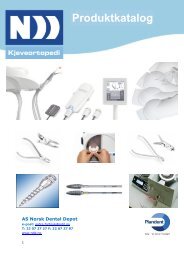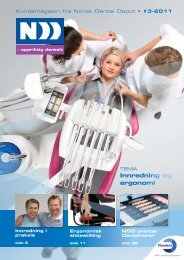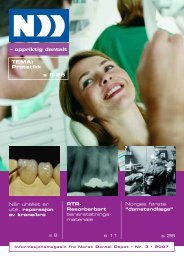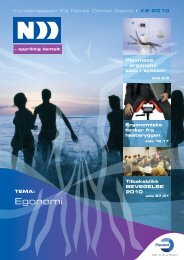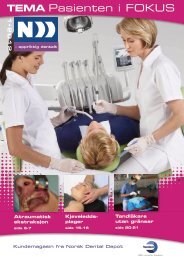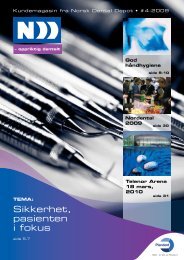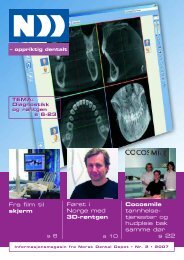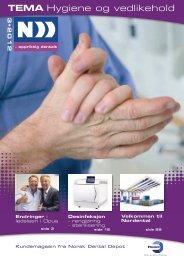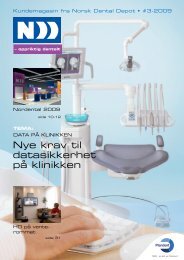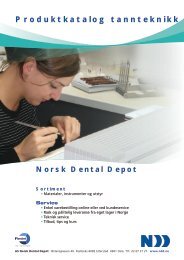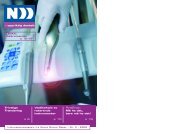Biodentine
Biodentine
Biodentine
Create successful ePaper yourself
Turn your PDF publications into a flip-book with our unique Google optimized e-Paper software.
12<br />
(O’Brien 2008)). This maturation process can be related to the decrease of porosity with<br />
time, which was illustrated previously. <strong>Biodentine</strong> is an evolutive biomaterial which<br />
improves its mechanical properties with time.<br />
Comparing the compressive strength of a classical glass ionomer (Fuji IX – GC), at 1 hour,<br />
the compressive strengths are similar. No continuous increase over one month can be<br />
observed with Fuji IX but <strong>Biodentine</strong> is significantly more resistant to compression.<br />
With ProRoot ® MTA, even after 1 day, the material has no mechanical resistance. As<br />
classical Portland cement, the mechanical strength develops after several days, reaching<br />
150 MPa after one week.<br />
This demonstrates the superiority of <strong>Biodentine</strong> for building in short time (9-12 min)<br />
sufficient mechanical resistance to be used as a dentine substitute, compatible with<br />
dental restorations.<br />
2.4 - Flexural strength<br />
The 3 points bending test has a clinical significance and is essential when the material<br />
is used for Class I, II and IV cavities. The higher the resistance to flexural strength, the<br />
lower the risk of fracture in clinical use.<br />
The value of the bending obtained with <strong>Biodentine</strong> after 2 hours is 34 MPa. Compared<br />
with that of other materials: 5-25 MPa (conventional Glass Ionomer Cement), 17-54 MPa<br />
(Resin modified GIC), 61-182 MPa (composite resin) (O’Brien 2008), it shows clearly that<br />
the bending resistance of <strong>Biodentine</strong> is superior to conventional GIC, but still much<br />
lower than the composite resin.<br />
The internal values of the flexural strength were 22MPa, very similar to Glass Ionomers<br />
(15-39MPa).<br />
2.5 - Vickers micro hardness<br />
Hardness can be defined as the resistance to the plastic deformation of the surface of<br />
a material after indentation or penetration. Measurements at different times have been<br />
evaluated<br />
The hardness increases in time when cements are immersed in distilled water (Colon in<br />
(Golberg et al., 2009)). After 2 hours, the hardness of <strong>Biodentine</strong> was 51 HVN and<br />
reached 69 HVN after 1 month. These values are comparable to those obtained with<br />
the resin modified GIC-Fuji II LC (36 HVN), and the composite resin-Post Comp II LC<br />
(97 HVN). Calcite is a mineral known to improve the hardness of cements. The formation<br />
of CSH gel reduces the porosity with time. The crystallization of the latter continues,<br />
therefore improving the hardness as well as other mechanical properties (sealing at the<br />
interfaces, compressive strength…).<br />
The reported micro hardness values for natural dentine are in the range of 60-90 HVN<br />
(O’Brien 2008). <strong>Biodentine</strong> has surface hardness in the same range as natural dentine.



